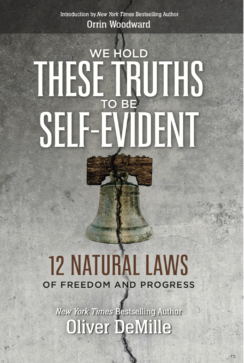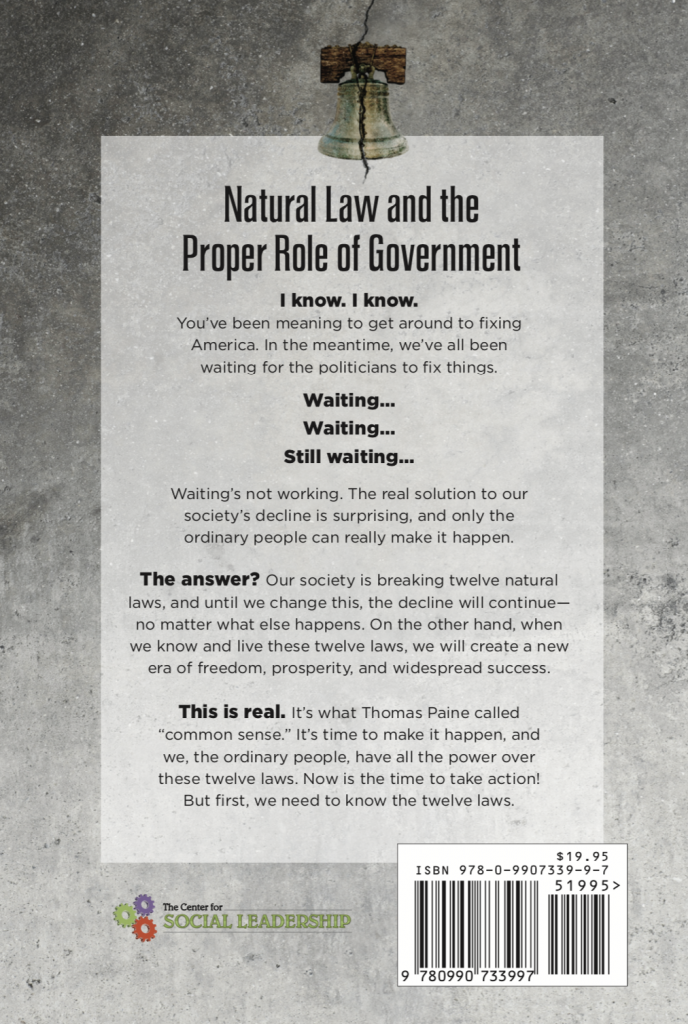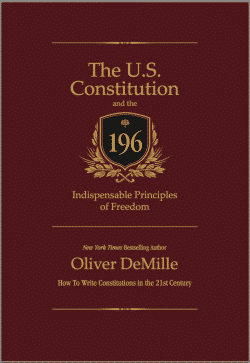Whether natural law or bigger government wins this battle will have more impact on all our daily lives than pretty much anything else in the world.
Chapter 1: The Law of Supremacy
Natural law, not manmade law, is supreme; it is the basis of all freedom and success, and all manmade constitutions and laws must adhere to natural law or freedom will decrease.
Two Concrete Examples * Moral or Political Laws * Four Types of Laws * The Need for Change
Chapter 2: The Law of Authority
In free societies, all government power comes from the people.
Of the People… * The Reason for Government * The Foundations of Government
Chapter 3: The Law of Limits
Free governments only succeed when they are strong and vigorous, and freedom only lasts if their power is effectively limited.
The Problem and the Solution * Widespread Education Vital for Freedom
Chapter 4: The Law of Delegation
The people may not delegate government any power that they do not possess by natural law.
Say it fast three times: Pufendorf, Pufendorf, Pufendorf
Chapter 5: The Law of Force
Humans can only morally use force on other people for self-defense, and government can only morally use force on people for the collective self-defense; any other use of government power is a violation of natural law.
Force Changes Things * Another Example * The Limits of Force * The Rules * The Law of Plunder * Bastiat’s Law
Chapter 6: The Law of Decline -OR- What Happens To Nations That Violate Natural Law?
When governments break natural law, the bring the decline of freedom and the decline of prosperity on their own nation.
The Solution
Intermission: The Proper Role of Government
Chapter 7: The Law of Power
It is the nature of power to try to centralize, and once it is centralized, to attempt to expand its control.
The Power Principle * Freedom in the Gaps * Anglo-American Gaps
Chapter 8: The Law of Gaps
Freedom is found in the gaps where governments compete for power.
The Ten Branches of Government * Freedom’s Success Formula * The Plan in Action * The Coming Challenge
Chapter 9: The Law of the Vital Few
Through history, real freedom ultimately depends on the leadership of a few ordinary people who do extraordinary things.
Power and Spoils * Gap Solutions * The Choice * Second Choice * Top Choice * The Law of the Vital Few
Chapter 10: The Law of Liberty
When freedom is reduced for a few, it is reduced for all.
The Law of Maturity * Consequences of Breaking the Law of Liberty * Consequences Today * Liberty and Justice Come from Indivisible Freedom
Chapter 11: The Law of Economy
All powers delegated to government must be entrusted to the lowest level of government that can effectively accomplish the desired goal; nations that adhere to this principle are consistently strong, vigorous and vibrant.
Why Governments Decline * The Role of Federal Governments * The Proper Place of Power
Chapter 12: The Law of Progress
The actual level of freedom and prosperity in any society is directly equivalent to the level of free enterprise.
Enterprise is Better * How Governments Break the Law of Progress * “Free” Enterprise * Test Your Government * Two Enterprises * Real Solutions
Epilogue: Knowledge is Power
Appendix:
A Brief History of Natural Law
All legislation is based on Natural law, and if it contradicts Natural law, that legislation cannot be valid. —Nicholas of Cusa, A.D. 1401–1464
The Power of a Common Language * Ideals and Fairness * Rules of the Road * Natural versus Positive Law * Natural Law in Scripture and Literature * The Lessons of Natural Law * Cicero’s Contributions * Aquinus and Grotius * John Locke and the Turning Point * William Blackstone * Blessings of Natural Law
The Great Conversation
Enlightened Statesmen will not always be at the helm. —James Madison, Federalist 10
The Backlash * Attack #1: Relativism * Attack #2 Empiricism * Attack #3: Romanticism * Political Parties * The Problem of Language * Community Matters * The Need
Recommended Readings on Natural Law
Notes
About the Author


 Introduction by Orrin Woodward
Introduction by Orrin Woodward







Reviews
There are no reviews yet.